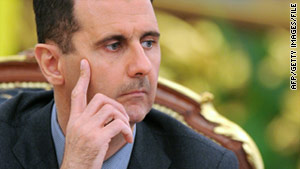 Since inheriting the Syrian presidency 11 years ago, Bashar al-Assad has cultivated the persona of a young reformer whose ambitions have been frustrated by internal and external pressure.
Since inheriting the Syrian presidency 11 years ago, Bashar al-Assad has cultivated the persona of a young reformer whose ambitions have been frustrated by internal and external pressure.
With a glamorous ex-banker wife at his side – Asma al-Assad was featured in a glowing portrait in Vogue in February – he has persuaded some Syrians and outsiders of a seemingly contradictory position: that he is in full charge of the country and yet not responsible for its police state.
Today, as the wave of Arab uprisings reaches Syria, with protests last week that left at least 60 people dead, political activists say Mr Assad faces perhaps his last chance to release the reform-minded personality his supporters claim has been repressed.
“The line of the government for the past 10 years is that the president is not to blame because people are obstructing him and that his image is separated from the regime,” says Obaida Nahas, an exiled dissident.
“Now that image is being confused and he needs to show that there is a difference between him and the regime.” In the unrest that first erupted in the southern tribal town of Deraa but spread last week to big cities across the country, the main slogan has been a call for freedom. Though there have been incidents in which Mr Assad’s portraits were torn down, the main targets of the people’s rage have been Assad family members, rather than the president himself.
“The idea is still that he has the opportunity to be proactive,” says a political analyst close to the government. “Syria is on a knife’s edge and needs to do something drastic to move away from the crisis.”
Whether the 45-year-old Mr Assad, an eye doctor who had little political experience when he was elevated to the presidency upon the death of his father, Hafez, ever had reformist leanings is far from clear.
He took power in a state run officially by the Arab socialist Ba’ath party but in reality controlled by a series of intelligence and security services.
Hopes for an easing of the heavy hand of the state were quashed when the young Mr Assad put an end to the so-called Damascus spring in 2001.
While jails were emptied of political prisoners in the earlier years of his presidency, human rights activists say they have filled up again. They estimate that about 4,000 people are now detained for their political beliefs.
People close to the government blame the early setbacks on an intransigent old guard inherited from Mr Assad’s father.
Towards the middle of the last decade, the justification for inaction was that the regime’s attention was diverted to fighting off foreign pressure amid growing tensions with western powers over Damascus’s policies in Lebanon, where it was blamed for the 2005 killing of a former prime minister, and its support for jihadis in Iraq. Mr Assad, however, successfully sidelined his father’s old companions, and concentrated power in the hands of his family, narrowing the base of a regime dominated by the Alawite minority, an offshoot of Shia Islam, that rules over a Sunni majority.
A series of economic reforms that introduced private banks and attracted some investment from abroad has given Damascus the feel of a more modern city. But while the business elite benefited, so have members of the president’s family. In 2008, the US banned American companies and individuals from doing business with Rami Makhlouf, a cousin of the president, citing him as a beneficiary and facilitator of corruption.
Political activists say Syrians are enraged by state corruption and the arbitrary behaviour of the intelligence and security services. Weeks before Deraa residents took to the streets to protest against the arrest of schoolchildren accused of writing anti-regime slogans on the walls, a dispute between a policeman and a driver in a Damascus Hariqa market had underlined the depth of frustrations.
Shops closed and owners marched to demand the detention of the policeman. The protest was contained only after the interior minister personally intervened.
Over the past week, the authorities’ response to the protests has been a mixture of harsh crackdown and fresh promises. As security forces were repressing demonstrations, the government announced the release of 260 prisoners and pledged to lift a 48-year state of emergency.
Farouq al-Sharaa, the deputy prime minister, said on Monday that Mr Assad would announce important decisions “that would please the Syrian people”, in the next two days. Political activists, however, say cosmetic reforms will not be enough.
“The country is a powder keg, there is an accumulation of grievances,” says Haitham Maleh, a human rights lawyer.
“The president has been studying decisions for the past 10 years. Now he has to take action.”
FT

Leave a Reply
You must be logged in to post a comment.